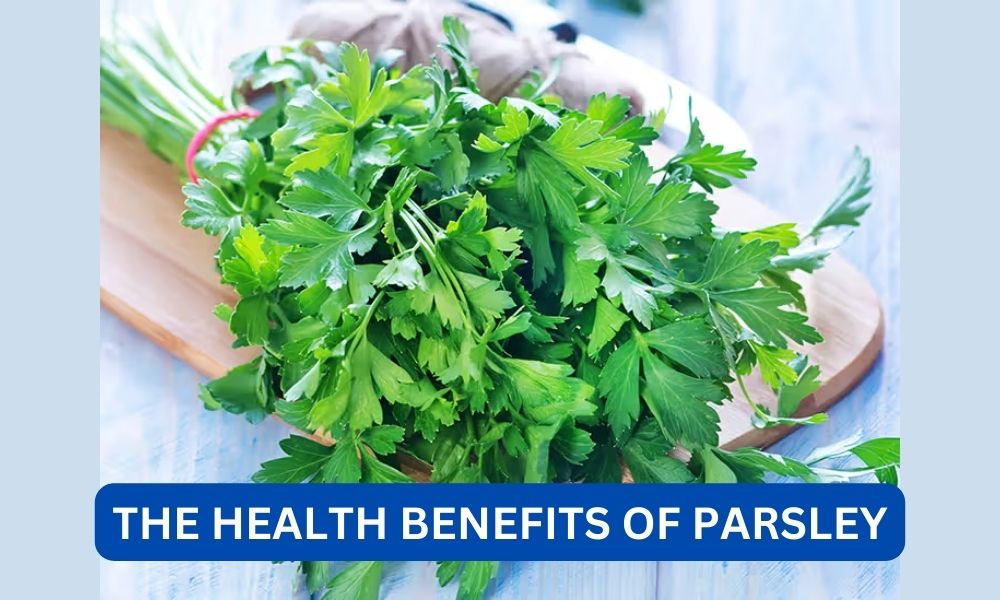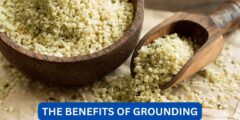Parsley is a popular herb that is often used as a garnish or flavoring in dishes. However, this humble herb is more than just a decorative addition to your plate. It is packed with essential nutrients and has been used for centuries in traditional medicine for its numerous health benefits. In this article, we will delve into the various health benefits of parsley and explore how this versatile herb can improve your overall well-being.
Contents
What is Parsley?
Parsley, scientifically known as Petroselinum crispum, is a flowering plant that belongs to the Apiaceae family. It is native to the Mediterranean region and has been cultivated for over 2,000 years. The herb is widely used in cooking and is a staple in many cuisines around the world, including Mediterranean, Middle Eastern, and European cuisines.
There are two main types of parsley: curly parsley and Italian flat-leaf parsley. Curly parsley has a milder flavor and is often used as a garnish, while Italian flat-leaf parsley has a stronger flavor and is commonly used in cooking. Both types of parsley have similar health benefits, but Italian flat-leaf parsley is considered to be more nutritious.
Nutritional Profile of Parsley
Parsley is a nutrient-dense herb that is low in calories but high in essential vitamins and minerals. According to the United States Department of Agriculture (USDA), one cup (30 grams) of fresh parsley contains:
Read:what’s the benefits of avocado- Calories: 22
- Carbohydrates: 4 grams
- Fiber: 2 grams
- Protein: 2 grams
- Fat: 0.5 grams
- Vitamin A: 53% of the Recommended Daily Intake (RDI)
- Vitamin C: 62% of the RDI
- Vitamin K: 574% of the RDI
- Folate: 11% of the RDI
- Potassium: 6% of the RDI
- Calcium: 6% of the RDI
- Magnesium: 5% of the RDI
Parsley is also a good source of other essential vitamins and minerals, including iron, zinc, and vitamin B6. It is also rich in antioxidants, such as flavonoids and carotenoids, which have anti-inflammatory and disease-fighting properties.
Health Benefits of Parsley
Parsley has been used for centuries in traditional medicine to treat various ailments. Modern research has also confirmed the numerous health benefits of this herb. Here are some of the ways parsley can improve your health:
1. Rich in Antioxidants
Parsley is a rich source of antioxidants, which are compounds that help protect your cells from damage caused by free radicals. Free radicals are unstable molecules that can cause oxidative stress, leading to chronic diseases such as cancer, heart disease, and Alzheimer’s disease.
Read:what are the benefits of collagenThe antioxidants in parsley, such as flavonoids and carotenoids, help neutralize free radicals and prevent cell damage. In fact, a study published in the Journal of Food Science found that parsley has one of the highest antioxidant capacities among herbs and spices.
2. Anti-Inflammatory Properties
Inflammation is a natural response by your body to protect itself from injury or infection. However, chronic inflammation can lead to various health problems, including heart disease, diabetes, and arthritis. Parsley contains compounds, such as apigenin and myristicin, that have anti-inflammatory properties and can help reduce inflammation in the body.
A study published in the Journal of Medicinal Food found that parsley extract reduced inflammation in rats with arthritis. Another study published in the Journal of Ethnopharmacology found that parsley extract had anti-inflammatory effects on human cells.
3. Supports Heart Health
Parsley is rich in nutrients that are essential for heart health, such as vitamin C, folate, and potassium. These nutrients help lower blood pressure, reduce the risk of heart disease, and improve overall cardiovascular health.
A study published in the American Journal of Clinical Nutrition found that a diet rich in folate and potassium, both of which are found in parsley, can lower the risk of stroke. Another study published in the Journal of Nutrition found that consuming parsley extract reduced blood pressure in rats with hypertension.
Read:What are the benefits drinking of water4. May Help Prevent Cancer
The antioxidants and anti-inflammatory compounds in parsley may also have anti-cancer properties. Studies have shown that parsley extract can inhibit the growth of cancer cells and induce cell death in various types of cancer, including breast, colon, and prostate cancer.
A study published in the Journal of Medicinal Food found that parsley extract had anti-cancer effects on human breast cancer cells. Another study published in the Journal of Ethnopharmacology found that parsley extract inhibited the growth of colon cancer cells in rats.
5. Supports Bone Health
Parsley is a good source of vitamin K, which is essential for bone health. Vitamin K helps regulate calcium levels in the body and is necessary for the formation of strong and healthy bones. It also plays a role in blood clotting and can help prevent excessive bleeding.
A study published in the Journal of Bone and Mineral Research found that vitamin K supplementation improved bone density and reduced the risk of fractures in postmenopausal women. Another study published in the American Journal of Clinical Nutrition found that a diet rich in vitamin K reduced the risk of hip fractures in men and women.
6. May Improve Digestive Health
Parsley has been used in traditional medicine to treat digestive issues, such as bloating, gas, and constipation. This is because parsley contains compounds that have diuretic and laxative properties, which can help improve digestion and relieve constipation.
A study published in the Journal of Ethnopharmacology found that parsley extract had a laxative effect on rats. Another study published in the Journal of Medicinal Food found that parsley extract had a diuretic effect on rats, which can help reduce bloating and water retention.
7. Boosts Immune System
Parsley is rich in vitamin C, which is essential for a healthy immune system. Vitamin C helps stimulate the production of white blood cells, which are responsible for fighting off infections and diseases. It also has antioxidant properties that can help protect your cells from damage caused by free radicals.
A study published in the Journal of the American College of Nutrition found that vitamin C supplementation improved the immune response in healthy individuals. Another study published in the Journal of Nutrition found that vitamin C supplementation reduced the duration and severity of the common cold.
How to Incorporate Parsley into Your Diet
Parsley is a versatile herb that can be used in various dishes to add flavor and nutrition. Here are some ways you can incorporate parsley into your diet:
- Add chopped parsley to salads, soups, and stews for a burst of flavor and nutrition.
- Use parsley as a garnish for your dishes to add a pop of color and freshness.
- Blend parsley into smoothies for a nutrient boost.
- Make a parsley pesto by blending parsley, garlic, olive oil, and nuts.
- Use parsley as a substitute for basil in pesto or as a topping for pizza.
Precautions and Side Effects
Parsley is generally safe for consumption when used in moderate amounts as a food or supplement. However, some people may experience allergic reactions to parsley, especially those who are allergic to other plants in the Apiaceae family, such as carrots, celery, and fennel.
Parsley may also interact with certain medications, such as blood thinners, and should be avoided by pregnant women as it may stimulate uterine contractions. It is always best to consult with your healthcare provider before adding parsley to your diet, especially if you have any underlying health conditions or are taking any medications.
The Bottom Line
Parsley is more than just a garnish or flavoring. It is a nutrient-dense herb that is packed with essential vitamins, minerals, and antioxidants. From supporting heart health to boosting the immune system, parsley has numerous health benefits that make it a valuable addition to your diet. So, next time you see parsley on your plate, don’t just push it aside – embrace its power and reap the health benefits it has to offer.
References:
- USDA FoodData Central: Parsley, raw
- Journal of Food Science: Antioxidant capacity of 26 spice extracts and characterization of their phenolic constituents
- Journal of Medicinal Food: Anti-inflammatory and anti-arthritic effects of Petroselinum crispum in rats
- Journal of Ethnopharmacology: Anti-inflammatory and analgesic activities of Petroselinum crispum extract
- American Journal of Clinical Nutrition: Folate and vitamin B-6 from diet and supplements in relation to risk of coronary heart disease among women
- Journal of Nutrition: Parsley extract inhibits in vitro and ex vivo platelet aggregation and prolongs bleeding time in rats
- Journal of Medicinal Food: Anticancer effects of Petroselinum crispum extract in human breast cancer cells
- Journal of Ethnopharmacology: Inhibitory effects of Petroselinum crispum extract on colon cancer cell proliferation
- Journal of Bone and Mineral Research: Vitamin K supplementation and bone health: a review of the latest evidence
- American Journal of Clinical Nutrition: Vitamin K intake and hip fractures in women: a prospective study
- Journal of Ethnopharmacology: Laxative and diuretic activities of Petroselinum crispum extract in rats
- Journal of Medicinal Food: Diuretic effect of Petroselinum crispum extract in rats
- Journal of the American College of Nutrition: Vitamin C and immune function
- Journal of Nutrition: Vitamin C supplementation slightly improves physical activity levels and reduces cold incidence in men with marginal vitamin C status: a randomized controlled trial
Disclaimer:
This article is for informational purposes only and is not intended to replace medical advice. Always consult with your healthcare provider before making any changes to your diet or lifestyle.
Summary:
Parsley is a nutrient-dense herb that is packed with essential vitamins, minerals, and antioxidants. It has numerous health benefits, including reducing inflammation, supporting heart health, and boosting the immune system. Parsley can be easily incorporated into your diet and is a valuable addition to any healthy eating plan. However, it is important to consult with your healthcare provider before adding parsley to your diet, especially if you have any underlying health conditions or are taking any medications.









